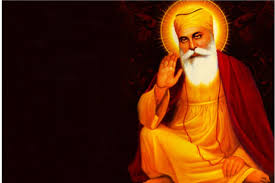The founder of Sikhism, Guru Nanak was born on 15th April 1469, in a Hindu family in the village Talwandi (now NankanaSahib in Pakistan) Punjab. His father’s name was Mehta Kalian Das (Kalu Ji) and his mother’s name was Mata Tripta Ji. He got married in 1487 to Mata Sulakhni and had two sons Sri Chand and Lakshmi Das.
Laster in life accompanied by Bhai Mardana ( a Muslim disciple), Guru Nanak Dev ji undertook four major spiritual journeys, running across India, South Asia, Tibet and Arabia. During those journeys, he preached to people about the new concept of God as “Supreme, All powerful and Truthful, Formless (Nirankar), Fearless (Nirbhay), Without hate (Nirvair), the Sole (Ek), the Self-Existent (Saibhang), the Incomprehensible and Everlasting creator of all things (Karta Purakh), and the Eternal and Absolute Truth (Satnam)”. Guru Ji taught people that the ‘One God’ dwells in every one of his creations.
After having spent a larger part of life travelling abroad and setting up missions, at the old age Guru Nanak returned home to Punjab and settled down at Kartharpur with his family. Here his followers would gather in the mornings and afternoons for religious services. He believed in a casteless society without any distinctions based on birthright, religion or gender. To promote a casteless society, he institutionalized the common kitchen called ‘Langar’ in Sikhism. Here all can sit together and share a common meal, irrespective of their respective social status, be that a king or a beggar.
